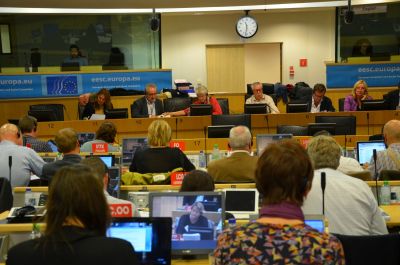
Adopted at the meeting of the Executive Committee on 2-3 December 2014
Investment for sustainable growth and decent jobs is a long-standing ETUC demand.
The ETUC therefore welcomes the EU focus on investment and concrete initiatives contributing to this end and, in particular, the recent initiative towards an EU-level investment plan.
Indeed we urgently need actions to provide high employment, decent work, high competitiveness and innovation through public and private investment. With more than 5 million young unemployed, quality jobs creation is a vital issue for the well-being of younger generations. Prosperity underpins high income in the public and private sectors.
Therefore the Juncker plan must prioritise investment, which creates jobs and focuses especially on countries with serious unemployment problems.
However, investments alone are not going to trigger growth. A policy to increase demand, and therefore wages, is indispensable, in parallel with an investment policy, since the investment deficit in Europe is largely linked to the lack of demand.
The ETUC is concerned that the size of the Commission’s investment plan is insufficient to meet the needs. Indeed, the investment deficit in the EU, in recent years, ranged from €280 to €515 bn during the worst part of the crisis. Therefore it is difficult to see how an investment plan of €315 bn over three years could be strong enough to trigger a U-turn in the European economy.
The ETUC plan is much more ambitious, calling for 2% of EU GDP per year for 10 years. A plan of that dimension is indispensable to lay the foundations for sustainable reindustrialisation of the EU, and to generate up to 11 million new jobs.
We are equally concerned about the feasibility of the Commission’s plan. The leverage ratio of 15 is based on returns from only the very safest investment. This could rule out any investment at all in much of Europe, limiting the impact to the countries already in the least difficulty. For the plan to reach even the level of investment it is targeting, it needs significantly more resources committed to the fund by the EU and Member States.
The ETUC calls for adequate democratic governance of the investment plan, and for the inclusion of social indicators in the selection criteria. Social partners at national level should participate in the selection of projects submitted for financing. The ETUC should be involved in the work of the European task force to ensure that the focus of investment is on the sustainable reindustrialisation of Europe, supporting decent jobs and good services.
Finally, we are concerned that the Commission’s plan focuses on neoliberal structural reforms, and furthermore could force governments into risky public-private partnerships, with taxpayers liable in the event of losses. We believe that Europe needs more social investment that should be excluded from the calculation of the public deficit.
The ETUC calls on EU institutions and Member States to support strong action on investment. Workers and citizens are expecting tangible results from Europe.
